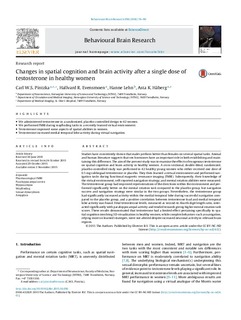| dc.contributor.author | Pintzka, Carl Wolfgang Schøyen | |
| dc.contributor.author | Evensmoen, Hallvard Røe | |
| dc.contributor.author | Lehn, Hanne | |
| dc.contributor.author | Håberg, Asta | |
| dc.coverage.spatial | © 2015 The Authors. Published by Elsevier B.V. This is an open access article under the CC BY-NC-ND license (http://creativecommons.org/licenses/by-nc-nd/4.0/). | nb_NO |
| dc.date.accessioned | 2015-11-23T10:41:26Z | |
| dc.date.accessioned | 2016-04-20T14:20:37Z | |
| dc.date.available | 2015-11-23T10:41:26Z | |
| dc.date.available | 2016-04-20T14:20:37Z | |
| dc.date.issued | 2016 | |
| dc.identifier.citation | Behavioural Brain Research 2016, 298:78-90 | nb_NO |
| dc.identifier.issn | 0166-4328 | |
| dc.identifier.uri | http://hdl.handle.net/11250/2386572 | |
| dc.description.abstract | Studies have consistently shown that males perform better than females on several spatial tasks. Animal
and human literature suggests that sex hormones have an important role in both establishing and maintaining
this difference. The aim of the present study was to examine the effects of exogenous testosterone
on spatial cognition and brain activity in healthy women. A cross-sectional, double-blind, randomized,
placebo-controlled study was performed in 42 healthy young women who either received one dose of
0.5 mg sublingual testosterone or placebo. They then learned a virtual environment and performed navigation
tasks during functional magnetic resonance imaging (fMRI). Subsequently, their knowledge of
the virtual environment, self-reported navigation strategy, and mental rotation abilities were measured.
The testosterone group had improved representations of the directions within the environment and performed
significantly better on the mental rotation task compared to the placebo group, but navigation
success and navigation strategy were similar in the two groups. Nevertheless, the testosterone group
had significantly increased activity within the medial temporal lobe during successful navigation compared
to the placebo group, and a positive correlation between testosterone load and medial temporal
lobe activity was found. Fetal testosterone levels, measured as second-to-fourth digit length ratio, interacted
significantly with parahippocampal activity and tended towards giving higher mental rotation task
scores. These results demonstrated that testosterone had a limited effect pertaining specifically to spatial
cognition involving 3D-visualization in healthy women, while complex behaviors such as navigation,
relying more on learned strategies, were not altered despite increased neuronal activity in relevant brain
regions. | nb_NO |
| dc.language.iso | eng | nb_NO |
| dc.publisher | Elsevier | nb_NO |
| dc.relation.uri | http://www.sciencedirect.com/science/article/pii/S0166432815302680 | |
| dc.rights | Navngivelse 3.0 Norge | * |
| dc.rights.uri | http://creativecommons.org/licenses/by/3.0/no/ | * |
| dc.title | Changes in spatial cognition and brain activity after a single dose of testosterone in healthy women | nb_NO |
| dc.type | Journal article | nb_NO |
| dc.type | Peer reviewed | nb_NO |
| dc.date.updated | 2015-11-23T10:41:26Z | |
| dc.source.journal | Behavioural Brain Research | nb_NO |
| dc.identifier.doi | http://dx.doi.org/10.1016/j.bbr.2015.10.056 | |
| dc.identifier.cristin | 1292069 | |

